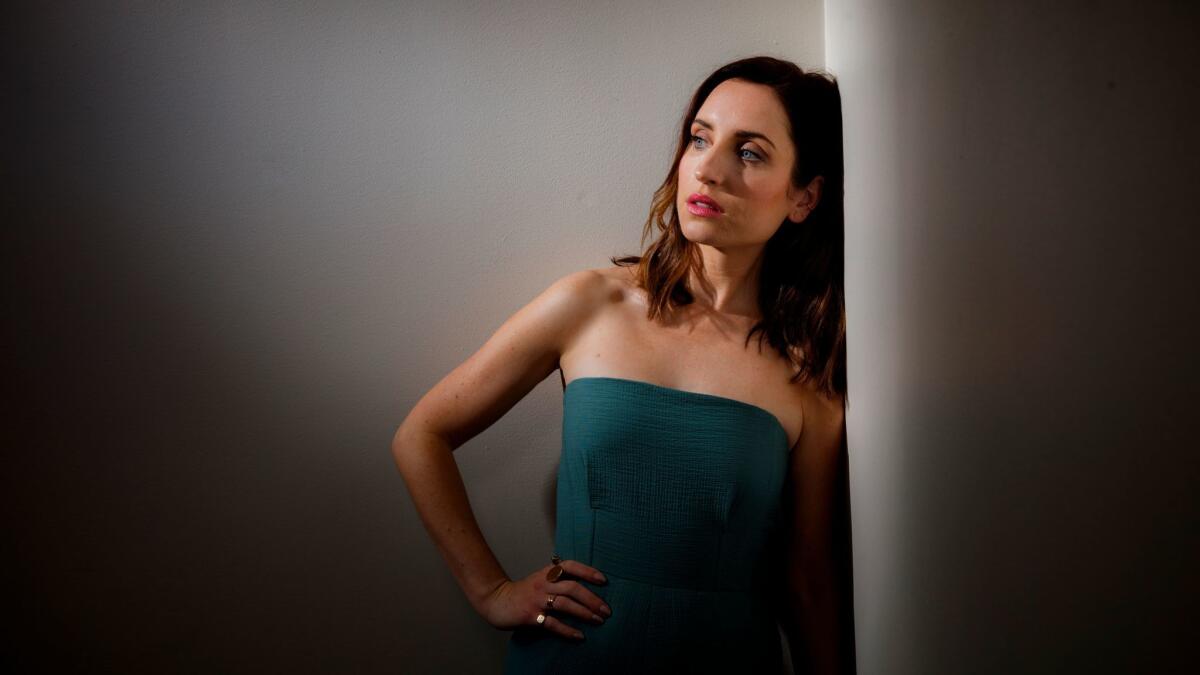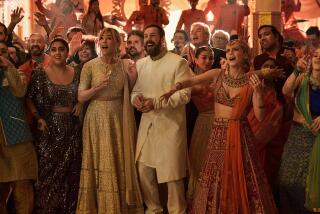Indie Focus: The future of moviegoing, ‘Wonder Woman’ and ‘Band Aid’
Hello! I’m Mark Olsen, and welcome to another edition of your regular field guide to a world of Only Good Movies.
The L.A. Times entertainment team put together a big package of stories on the past, present and future of moviegoing to make sense of a moment when audience habits and industry practices seem to be in transition.
Ryan Faughnder looked at innovations to the theatergoing experience, from upscale concessions to projection and sound technologies to virtual reality. And Christopher Hawthorne took a look at the intersection between architecture, technology and moviegoing.
Glenn Whipp and Justin Chang both wrote about changing attitudes toward theater etiquette. Jeffrey Fleishman chronicled his experiences seeing movies in other countries.
Kenneth Turan wrote about how the buzz before seeing a movie (or avoiding it) can impact how one watches a movie. Amy Kaufman went to the movies with a group of local teens.
Sonaiya Kelley took in the local rooftop screening scene. Kevin Crust checked in with Last Remaining Seats, the Los Angeles Conservancy’s program of showing classic films in old movie palaces.
Jen Yamato wrote a profile of L.A.’s New Beverly Theater and the community of movie-lovers who work and go there.
I surveyed the ecosystem of local repertory theaters that have a renewed sense of purpose and collaborative spirit in an era of streaming, working to broaden audiences’ connection to the history of cinema.
We’re kicking off our summer screenings this week with “Beatriz at Dinner,” a pungent social satire about what happens at a dinner party when people don’t properly read the room, starring Salma Hayek and John Lithgow. We’ll have director Miguel Arteta for a Q&A. For RSVP info and updates on future events, go to events.latimes.com.
‘Wonder Woman’
The recent round of comic book superhero movies has been missing a few things, such as a story focused on a female lead and a movie directed by a woman. Now, with “Wonder Woman” — starring Gal Gadot and directed by Patty Jenkins — audiences are getting both at once, which also has placed an additional set of expectations on the film, as its success or failure is being seen as a bellwether for future female-fronted superhero sagas. That, in turn, makes it all the more exciting that the film is being received as little short of a triumph.
In his review for The Times, Justin Chang noted, “ ‘Wonder Woman’ emerges as not only the strongest movie in the present DC cycle, but also the first one that feels like an enveloping, honest-to-God entertainment rather than a raging cinematic migraine.”
The Times’ Meredith Woerner interviewed Jenkins, who explained her goal for the project: “I believe in Wonder Woman and the true spirit of Wonder Woman, and I wanted to tell that story. … I think that what Wonder Woman stands for is gorgeous and incredible. And so that was it. That’s what I wanted to do.”
Woerner also spoke to Gadot and her co-stars Robin Wright and Connie Nielsen.
At Time, Stephanie Zacharek opened with the question “Can a woman build a better superhero movie?” She went on to say the movie is “a cut above nearly all the superhero movies that have been trotted out over the past few summers.”
At Vanity Fair, Rebecca Keegan noted, “It’s a good thing Wonder Woman has such strong shoulders, because she’s carrying a lot on them in her new movie.” Keegan spoke to Warner Bros. President of worldwide distribution and marketing Sue Kroll, who addressed the challenge of finding the right tone in the marketing: “You want to make sure this is certainly a movie that women can embrace in a very meaningful way. ... But I do think it’s equally important that people feel like this film is for them. Men, women, young and old, kids, grandma, everybody. We always have to be careful and create that balance, so that you’re not alienating anyone.”
For BuzzFeed, Alison Willmore lauded the movie’s addition to its extended cinematic universe, saying, “Because of Wonder Woman, the film and the character, that grand corporate plan doesn’t seem quite as hubristic; she doesn’t feel like another bewilderingly warped, barely recognizable take on an iconic character. She feels like a genuine superhero, intent on protecting those in need — you can tell, even when she’s wearing glasses.”
Amy Nicholson at MTV News pointed out how the movie itself wears the mantle of all it has to bear, noting, “What interests Jenkins isn’t Diana’s might. It’s her mindset. ‘Wonder Woman’ is a straightforward action-adventure that doesn’t screech to a halt to deliver big speeches about feminism. It wouldn’t occur to Diana that the world needs to hear the obvious, at least not yet. In her first days in civilized society, she walks through sexism the way most people walk through flu season. What’s the use of swatting invisible germs?”
At the AP, Lindsey Bahr added, “Like the heroine at its center, ‘Wonder Woman’ the movie rises with powerful grace above the noise. It’s not perfect, but it’s often good, sometimes great and exceptionally re-watchable.”

‘Band Aid’
Zoe Lister-Jones writes, directs and stars in “Band Aid,” and finds at least one way to do “Wonder Woman” one better — the film was made with an all-female crew. The story of a married couple (Lister-Jones and Adam Pally) who start a garage band with the their weird neighbor (Fred Armisen) to work out their issues as a couple, the movie is a playful, emotional and spiky mix.
In her review for The Times, Katie Walsh wrote that “ ‘Band Aid’ is a charming and profoundly affecting film that dives into the messy business of creation, which is so closely tied to perceptions of self-worth, in a world that places value judgments on the kinds of things we make. In this film, Lister-Jones makes the argument for embracing more kinds of creation, more failure and more play as a means of renewing the relationship to oneself and the others around us.”
The Times’ Amy Kaufman spoke to Lister-Jones about making a film with a purposefully all-female crew.
“There was a part of me that was interested in subverting a paradigm in order to challenge a system that is really broken,” she continued. “Even though there’s been a lot of dialogue around the underrepresentation of women crews, the numbers aren’t changing. In fact, they’re getting worse. I just felt like since I was in a position to do so, it was kind of my duty to.”
‘The Death of Louis XIV’
Written and directed by festival-circuit favorite Albert Serra, ‘The Death of Louis XIV’ is exactly that, a study of the end of days for the 18th century French king. Featuring Jean-Pierre Léaudin a riveting performance that finds the actor seemingly contemplating his own death, the film is spellbinding.
Reviewing the film for The Times, Justin Chang noted, “His performance is finally a magnificent stare into the abyss, a sustained contemplation of things we would rather not dwell upon but will ultimately have to face. He surrenders to the great equalizer that is death and emerges, somehow, looking like an artist newly born.”
For the New York Times, Glenn Kenny added, “As for Mr. Serra, while he often enjoys playing the foppish provocateur in his interviews, his film is sober, meticulous and entirely convincing in its depiction of period and mortality.”
For Film Comment, Yonca Talu interviewed Leaud, who spoke candidly about how the film helped him find clarity in his feelings toward his own mortality. “By way of this film, I accepted the wisdom of old age and that I am going to die. I have reached an acceptance of the meeting, and this meeting is death. It feels good to be able to keep working in the profession that I love with good directors. I will die happy.”
‘Maurice’
The 1987 James Ivory and Ismail Merchant collaboration “Maurice” has been rereleased to theaters. Starring a young Hugh Grant alongside James Wilby, the movie is an adaptation of a E.M. Forster novel about two young men grappling with their love affair against the backdrop of the English privileged class just before World War I.
In his original review for The Times, Kevin Thomas said the film “is timeless both in the larger sense — in its luminous depiction of an individual struggling against his fate — and in the more specific sense, as a story of homosexual experience.”
For The Times’ current review, Gary Goldstein wrote about the film and its rerelease and spoke to Ivory and Wilby about its production. Ivory said that though the film was not a big hit in its day, it is one that people frequently mention to him. “I found over the years that women like the film a lot and young girls too,” Ivory said. “It’s not entirely a gay film. It’s a genuine romance — a sexually charged romance — and that appeals to most everybody.”
In her original review for the New York Times, Janet Maslin said the film “unfolds with its own rhythm, at a languid, leisurely pace that makes the small details as noticeable as the major ones. It doesn’t race, but neither does it meander.”
Email me if you have questions, comments or suggestions, and follow me on Twitter @IndieFocus.
More to Read
Only good movies
Get the Indie Focus newsletter, Mark Olsen's weekly guide to the world of cinema.
You may occasionally receive promotional content from the Los Angeles Times.











